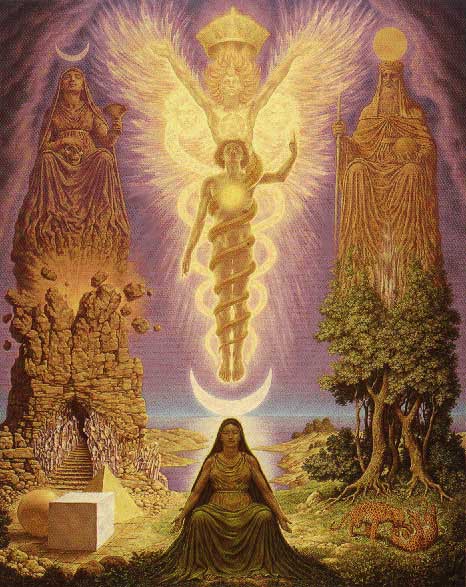It will come as no news to you that I find Gnosticism very fascinating, and that for a number of reasons. As Hans Jonas explained, it is a mythologized portrait of a particular kind of life-stance with which we may identify without signing on for all the crazy cosmological doctrines of the ancient Gnostics. “Gnosis†is Greek for “knowledge,†and it developed the connotation of esoteric or elite knowledge, saving knowledge, and knowledge so controversial in its implication that those party to it must be very careful not to impart it too quickly to those not ready for it: “You can’t handle the truth!â€
Even without the doctrines of a Fall within the Godhead, of the creation of the material world by the bungling Demiurge, etc., the Gnosis of which I speak is rightly called “saving†knowledge because the possession of it constitutes true enlightenment. Many, many things become clear for the first time. One’s perspective changes. One sees everything in a new light. There is great wisdom in it, if only one will apply it, and one must apply it, in just the same way the navigator of a submarine must and will use what his sonar tells him: once he becomes aware of obstacles in his sub’s path, he will of course steer clear of them.
After gaining the Gnosis, one does not make the choices and the judgments one formerly made. His associates will not understand why he does not, and it will not necessarily help if he tries to explain. The explanation will likely be even more baffling to them. Christian and Sufi Gnostics learned early to be circumspect, even evasive, about their new knowledge lest they goad outsiders into persecuting them. And they learned it the hard way. People tend not to want to question inherited assumptions (about religion or anything else). To question erodes their cherished sense of security and makes them feel disloyal to their parents and teachers. The Gnostic is the one who has come to prize truth above these things (who knows why this person does and that one doesn’t?), and it is a big mistake to imagine that everyone, their fine-sounding rhetoric notwithstanding, feels this way.
The one who dares to question understands truth in a formal sense: whatever it is, he wants to find it, to fill in that blank. Even if he never manages to find the answer, he knows that the search itself will profit and nourish him. By contrast, the one who is loyal to traditional verities and unwilling to reconsider them understands and cherishes truth in a material sense. For him, “truth†is defined as denoting the content delivered him by tradition. He has no blank to fill and thus seems to have nothing to seek.
The Gnostic will be reviled as a disdainful elitist: “this multitude that knoweth not the Law is accursed†(John 7:49). But that is defensive projection by those who resent, not the actual attitude of the Gnostic, but rather the insecurity they begin to feel in his presence. The real attitude of the Gnostic is that of the Bodhisattvas of Mahayana Buddhism: an impartial compassion toward all and a (sagaciously cautious) eagerness to share the Gnosis. The Gnostic follows the examples of two great forbears. Like Diogenes, he goes about, lantern lit in the daytime, with an eye out for those who have become dissatisfied with the standard account of things and are looking for something better: “What do I still lack?†(Matthew 19:20). He does not want to come on like an uninvited Jehovah’s Witness at the door, trying to sell unwanted goods. And like Socrates, the Gnostic does not ask anyone to take anything on faith, but to reason it out to see the truth for himself. (This is why the best way to open up a biblical literalist to the Higher Criticism is to ask him if he does not prefer an approach that elucidates the puzzles of the text instead of creating more of them.)
What, you ask, is this much-vaunted knowledge? Simply, it is the accumulated knowledge and insight of the modern world, the things intellectuals know or are trying to learn. Intellectuals tend to speak of “modern man,†as if everyone were clued in, on the same page. But they are not, and people’s haphazard, destructive behavior demonstrates that.
Freud and Jung were Gnostic revealers (like Morpheus in The Matrix). Paul speaks for most folks when he says, “I do not understand my own actions†(Romans 7:15). Who does? These two great psychoanalysts invented ways to shine a light deep into the caverns of our unconscious/subconscious mind and to reveal the unsuspected cave paintings down there that explain so much. Once you read these men, you can begin to understand your own secret motives, your fears that cause you to repeat destructive patterns rather than risking success and growth, and so on. You find you can understand the foibles and foolishness of those around you and bear with them in compassion instead of hating them.
Denis de Rougemont (Love in the Western World) explains why people seek extramarital affairs, sacrificing security and loyalty for the thrill of what they think is a pure love unfettered by either mundane circumstances or responsibilities. He shows how this urge reflects a spiritual eros that Plato talked about, nourished in ancient and medieval Gnosticism (the love of the soul for the transcendent Lady Wisdom, Sophia), driven underground by heresy-hunters and quickly resurfacing disguised in the lyrics of Courtly Love, then debased and demythologized as “romantic†adulteries affairs. (Obviously, adultery is much older, but De Rougemont’s discussion presupposes the more recent invention of romantic love.)
Erving Goffman (The Presentation of Self in Everyday Life and Interaction Ritual) shows us the great degree to which our everyday conduct is an intricate dance with carefully defined and minutely dictated steps which we are taught implicitly by imitation as we grow up and are socialized.
Peter L. Berger and Thomas V. Luckmann (The Social Construction of Reality, The Sacred Canopy, The Invisible Religion) are sociologists of knowledge. They widen the scope of understanding the social world around us, laying bare the mechanisms of externalization and reification whereby the ad hoc corporate creations (religions, governmental systems, class norms, etc.) of a founding generation take on a life of their own when the next generations inherit them as unassailable givens. They show how and why our assumptions seem so self-evidently true to us: indoctrination and peer pressure, isolation from those with different inherited views, activities of apologists and “legitimators†of one’s own culture’s beliefs, etc.

Literary Structuralists and Narratologists (Roland Barthes, Gerard nette, Seym Chapman, etc.) let us in on the many magician’s tricks authors use to weave their seductive spells, hypnotizing their readers into the state of “temporary, willing suspension of disbelief. “Ah! Now I see what he’s doing! Hmmm… I bet I could do that myself!†It’s like learning physiology and anatomy: your body works on its own. You didn’t have to learn how to breathe, eat, etc., but you gain considerable advantage by learning how and  why things function as they do. New Thought theorists like Ernest Holmes and Charles Fillmore helped many to understand that most of their troubles are of their own making and that they have the power to change that by redirecting their habits of thought and using visualization and mantra-like affirmations. Nothing spooky, it is a technique to marshal one’s energies to achieve what had seemed impossible because of our fatal assumption that the future must be a replay of the past with its misfires.
I could go on and on. Once you take the time and trouble to learn such things, you have taken what Don Cupitt calls “the leap of reason,†and you gain a sky-top perspective on the whole human ant-hill and how it works. Like the ancient Gnostics and mages, you know the secret forces and mechanisms of the world you live in, both social and scientific. They appear esoteric and occult only because the vast majority of our contemporaries have neither time nor opportunity to learn what we know.
You have been thinking, the whole time, how so many of society’s problems are the fault of self-proclaimed “philosopher kings†who know only fancy notions such as I have discussed and who inhabit a world of pure theory, trying to impose it onto the rough terrain of a recalcitrant reality where it does not work so well. Granted. Knowledge and wisdom are by no means the same thing. But I think that, while you can have knowledge without wisdom, you can’t be wise without knowledge.
So says Zarathustra.


3 Responses to The Gnosis